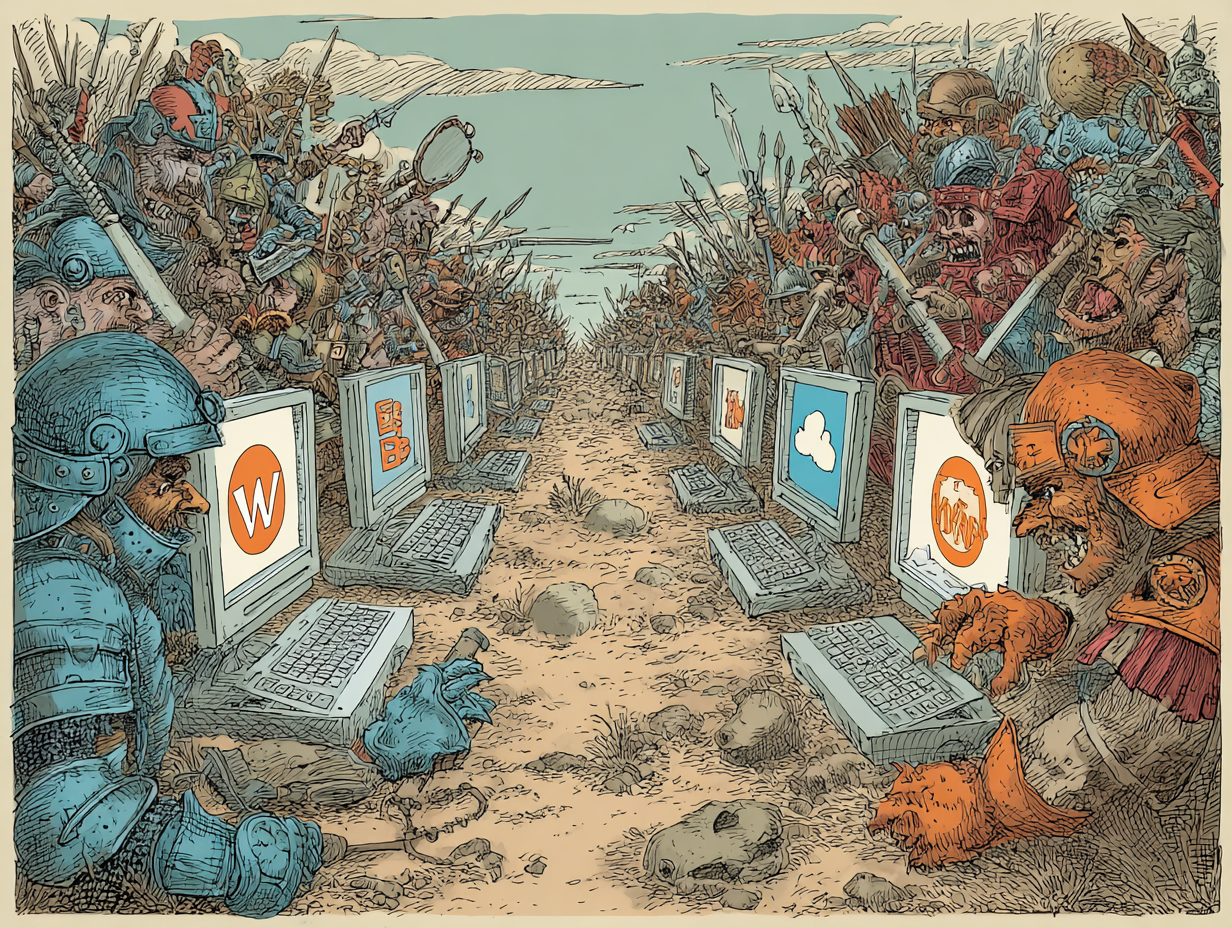Begun, the AI Browser Wars Have
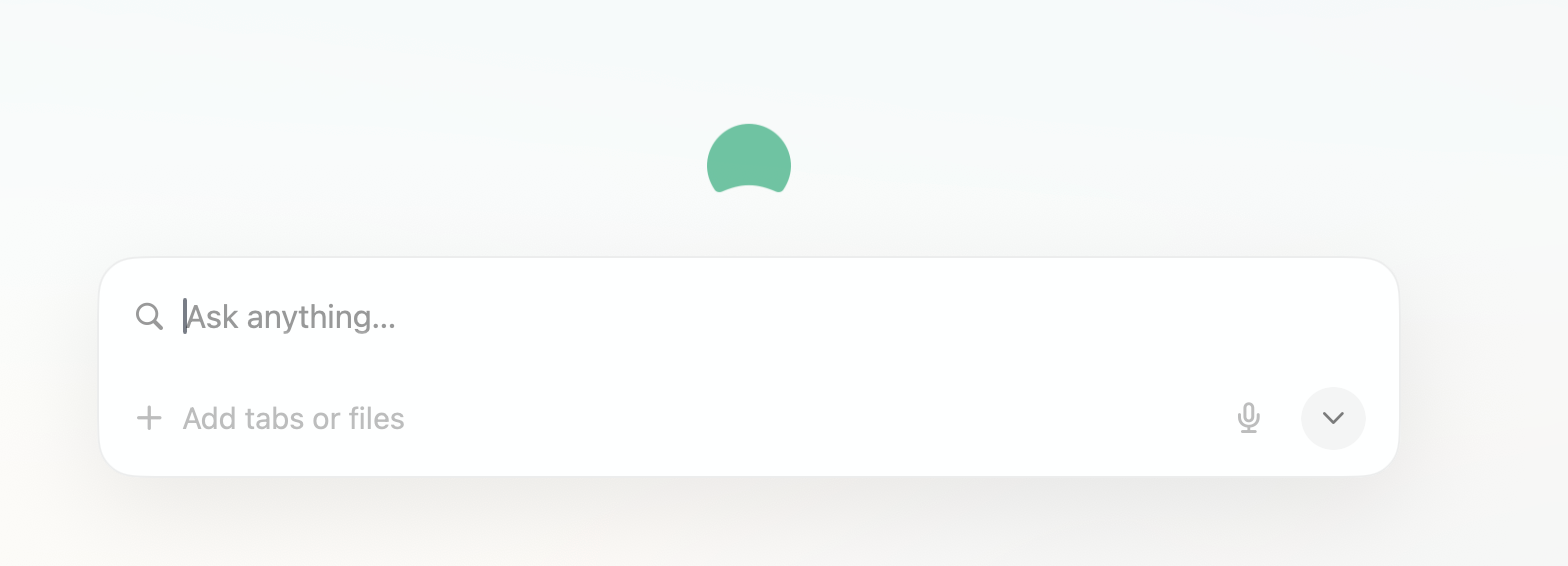
About a week ago, I bit the bullet. Reading the writing very clearly on the wall, I abandoned the Arc browser and jumped ship over to Dia, the new AI-first web browser built by The Browser Company. It took a while, but now I think I'm sold. I'm not sure that Dia itself will be the browser of the future, but I'm more certain than ever that an AI-centric browser will be.
At first, I found Dia to be a bit too simple for my taste. Because Arc had such a plethora of power-user features, many of which took a lot of training to get used to, it was hard to "downgrade". Of course, that's also the exact reason why The Browser Company shifted the focus to Dia. While Arc had a dedicated fan base, it was also clearly never going to go fully mainstream. They had made a better browser for web power users, but most people were not web power users – at least not in the sense that they would take the time to learn new tricks when Chrome was likely good enough for them. It was a tricky spot for the company to be in, they had sort of painted themselves into a dreaded middle ground.
Too beloved to fail, too small to succeed.
So they sort of went down a third path, letting Arc live on, but really just with underlying engine (Chromium) updates. It's more or less in "maintenance mode" – something which they'd love to outsource, it seems. But they also can't fully open source the browser because they're now using some of the infrastructure to build Dia. Again, the writing is on the wall for what happens to Arc one way or another now. And at first this was extremely annoying to me – again, I had put so much time and muscle memory into using their browser. But I also get it.
And now I can happily say that I get Dia too. The simplicity is clearly the strength right now. It's sort of like if Chrome was built from the ground up to be AI-first. And I think a lot of people will understand that. Certainly more than understood Arc.
Front and center, the fact that Dia looks like Chrome helps a lot. To be fair, most browsers now look like Chrome. One of the ones that didn't was Arc, notably because of its side-tabs. I miss the side-tabs when it comes to (tab) information density, and it seems like The Browser Company is working on ways to perhaps bring them back as an option within Dia. But the default should clearly be what people know: top tabs.
Because what you're asking people to do here is not re-learn the fundamentals of web browsing, you're asking them to take what they already know and augment it with AI. The fact that a lot of what is working in these early days of AI sort of looks like paradigms we already know doesn't seem like an accident. From ChatGPT – which looks like, yes, chat – on down, what's old is new again, at least for now. And so Dia is essentially Chrome + AI.
But wait, doesn't Chrome itself already have AI baked in? Yes, Google is testing natively integrating Gemini into the browser in the beta channels of Chrome itself right now. I'm pretty surprised by this given all the antitrust action currently surrounding the company – and Chrome itself. But it highlights just how seriously Google is taking the AI threat – and undoubtedly how much they believe in the promise of the technology. That said, Gemini in Chrome is comically clunky right now. It feels tacked on because it's nearly literally tacked on. It's this weird overlay thing that feels far more like a third-party extension than a part of the browser. Worse, it's slow. It's not a good product at the moment. But again, it's in beta.
Then again, Dia is also in beta. And it is a good product right now. They're using Google's strength against them. Because Chrome has three billion-plus users, they can't fundamentally change the browser overnight with an update. They have to tack things on and hope they don't annoy too many current users. With Dia, The Browser Company has a clean slate to do as they wish. The fact that they seemingly have better product designers helps too.
It's interesting, you could basically just use Dia as a slightly cleaner-looking version of Chrome – there's noticeably less toolbar cruft – and never touch the AI elements, and I assume plenty of people would be perfectly happy with that. But, of course, no one is going to do that. Nor should The Browser Company want that. If Dia is going to succeed, it will be because of AI.
As such, they're now in a foot race. As mentioned, Google is sort of jogging at the moment, but they sort of have to given those three billion-plus users and the DoJ situation. Basically every other browser is now dabbling in some level of AI as well. But again, most of those are legacy players where AI is getting tacked on. The far more interesting ones are the browsers being built from the ground-up for this world. So I would expect Perplexity and yes, OpenAI to be Dia's main competition here.
Some people are testing Perplexity's "Comet" browser at the moment and it will probably be released in some sort of open beta test relatively soon. No one knows the details about what OpenAI is cooking up, but they're clearly doing something behind-the-scenes simply based on some hires they've made. And the fact that they've made it clear they'd want to acquire Chrome if the government makes Google sell it off. I don't believe that's going to happen and even if it did, I don't think there's anyway OpenAI would be allowed to buy it as that would essentially be the government passing a crown from one king to the next. (Not to mention the fact that I have to imagine Google would ask for something like $100B to part ways with a product that is extremely valuable to them, but less so to anyone else given the business realities of web search.)
But also, anyone who uses Dia should see why all of these players will build their own browsers. Extensions aren't going to be good enough here, you have to go deeper to fully control the experience and have full vision into what's going on in that browser. If that sounds scary as an end-user, it honestly sort of is! You're placing a lot of trust – and data – in the hands of whomever is building your browser. That's undoubtedly a case that Google is going to make against the upstarts. But it's also the argument that they're going to use against Google...
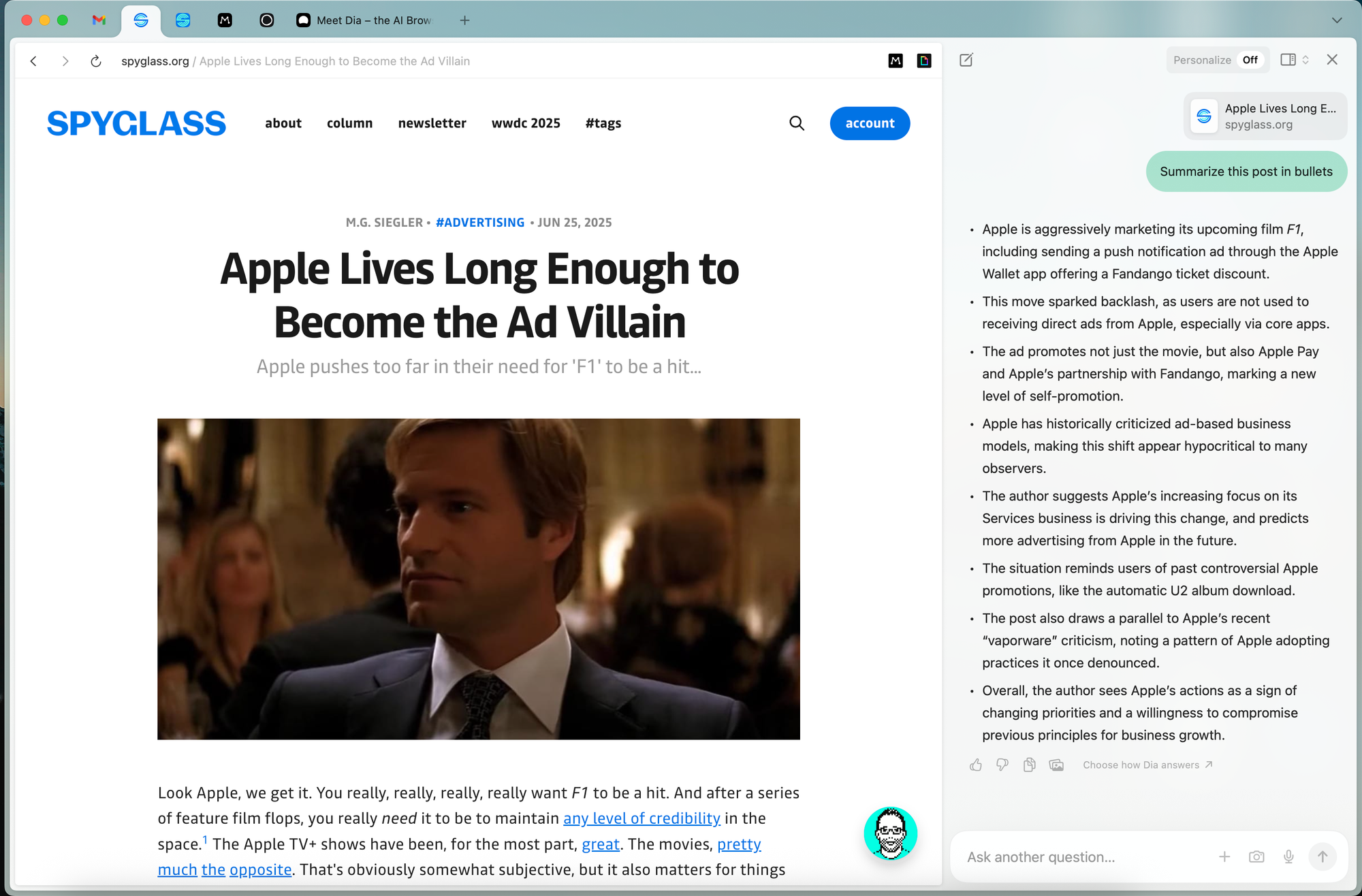
I realize I'm 1,200 words into this and haven't really said what you can do with AI inside of Dia. But honestly, that's almost secondary at this point. It's early days and a lot of functionality is still being built (and seemingly dreamed up). What you can do right now is have an AI chatbot deeply integrated into your browsing experience. It's right there on the righthand side of every page you visit, built into yes, the chrome. So instead of copying and pasting a link into ChatGPT or your AI tool of choice and then asking a question, it saves you that step.
And, more powerfully, it allows you to query every tab you have open all at once to cross reference. It's the kind of stuff that's almost too obvious and so you only start really utilizing it when you remember that you can. Or, at least, that's how I've slowly but surely been building it into my workflows. I now often ask for summaries of longer news items I'm reading. And I'll dive deeper into various topics without leaving the tab(s). Again, obvious stuff, but profound in how seamless it is to do without, say, switching over to the ChatGPT tab.
And while Dia isn't yet going down the path of more "agentic" work, it's obviously just sitting right there. OpenAI's 'Operator' has made this abundantly clear – by leveraging their own custom Chrome as well, no less (albeit in the cloud). Such use cases are clearly going to be a key in wanting to own and operate the browser.
But ChatGPT also has native apps, of course. As do others like Perplexity and Claude. Those can be powerful in different ways because they live outside of the browser. But similar to owning the browser experience, one assumes that at some point the OS makers will have an advantage here as well. To their credit, Microsoft recognized this almost immediately – and then immediately stepped on a big old rake in the form of their 'Recall' feature, which as it turns out was a security nightmare. To the point where they had to pull it and go back to the drawing board (it's back now, finally, but one has to wonder how much trust Microsoft killed with their botched roll out.) Apple should get around to adding such features in 2035 – which I can now tell you will be in macOS 36, thanks to their recent naming scheme change. So there's that.
But really, Apple should probably partner will someone to bake some level of AI into macOS before Siri is ready to do so. The new Spotlight in macOS 26 seems impressive, imagine if it was a full-on AI assistant...
Google can and will bake Gemini into ChromeOS of course. But it will face the same issues as with Chrome. Still, if Gemini continues on its current path and gets good enough, it could be a reason for people other than students and/or budget-oriented shoppers to buy Chromebooks. Microsoft and Apple (and Dell, HP, etc) should probably keep their eye on that too.
Anyway, back to the browser. While it's nice to have the native ChatGPT app, the truth is that 90%+ of what I do is in a web browser. And so it's more convenient to have the AI tools directly baked into it for all the obvious reasons stated above. At the same time, Dia hasn't negated my usage of other AI services, because for one thing, ChatGPT remains far better at most tasks.
Case in point: when I asked Dia which AI models it was powered by, it gave me a completely wrong answer, thinking I was talking about a text-to-speech model with the same name by Nari Labs. But when I asked ChatGPT, it immediately knew what I meant and gave me the correct answer – which, humorously, is primarily GPT-4o! But Dia is using some special sauce behind the scenes to meld models together, including, it seems, Gemini Flash.
To be clear, for most queries I've tried, Dia seems to work well – or I wouldn't use it! – but again, it's not as good as going direct, as it were. At least not yet. But the fact that they can merge models together and hide that complexity for end users seems like a huge potential strength here. And one that could help them combat, say, OpenAI's browser (which presumably will not use Google's models!).
Anyway, it's early days. But Dia shows an obvious glimpse of what's to come for the web browser. To the point where I almost wonder if Apple isn't going to be at a disadvantage because they completely lock-down browser development on iOS/iPadOS. While they have been able to get away with forcing everyone to use Safari (or basically a wrapper around Safari) on their devices, AI could change that equation. I have to imagine people are going to want the same AI-native browsing experience on mobile as they have on their desktop after getting used to this. So either Apple will have to open such development up more than they have, or they'll have to lead with Safari here. And... I'm not holding my breath on that one!
Another related point is the notion of "memory" for all these products. It's a recent addition to Dia and it could end up being crucial when consumers decide which product to go with. As I've written about before, I'm wary of the "old school" players like Google and Meta using actually old memories – aka data – from a decade or two ago in these products – and you could easily see how it could (and undoubtedly will) backfire – but OpenAI is positioned well here, obviously.
But Dia is here first. And it's good. I still miss some things about Arc – mostly the "Little Arc" windows, to be honest – but the AI trade-offs as I work them into my workflow are starting to make it worth the switch. And again, it's just so obvious that this is at least directionally the way things are heading.
Let the new browser wars begin.
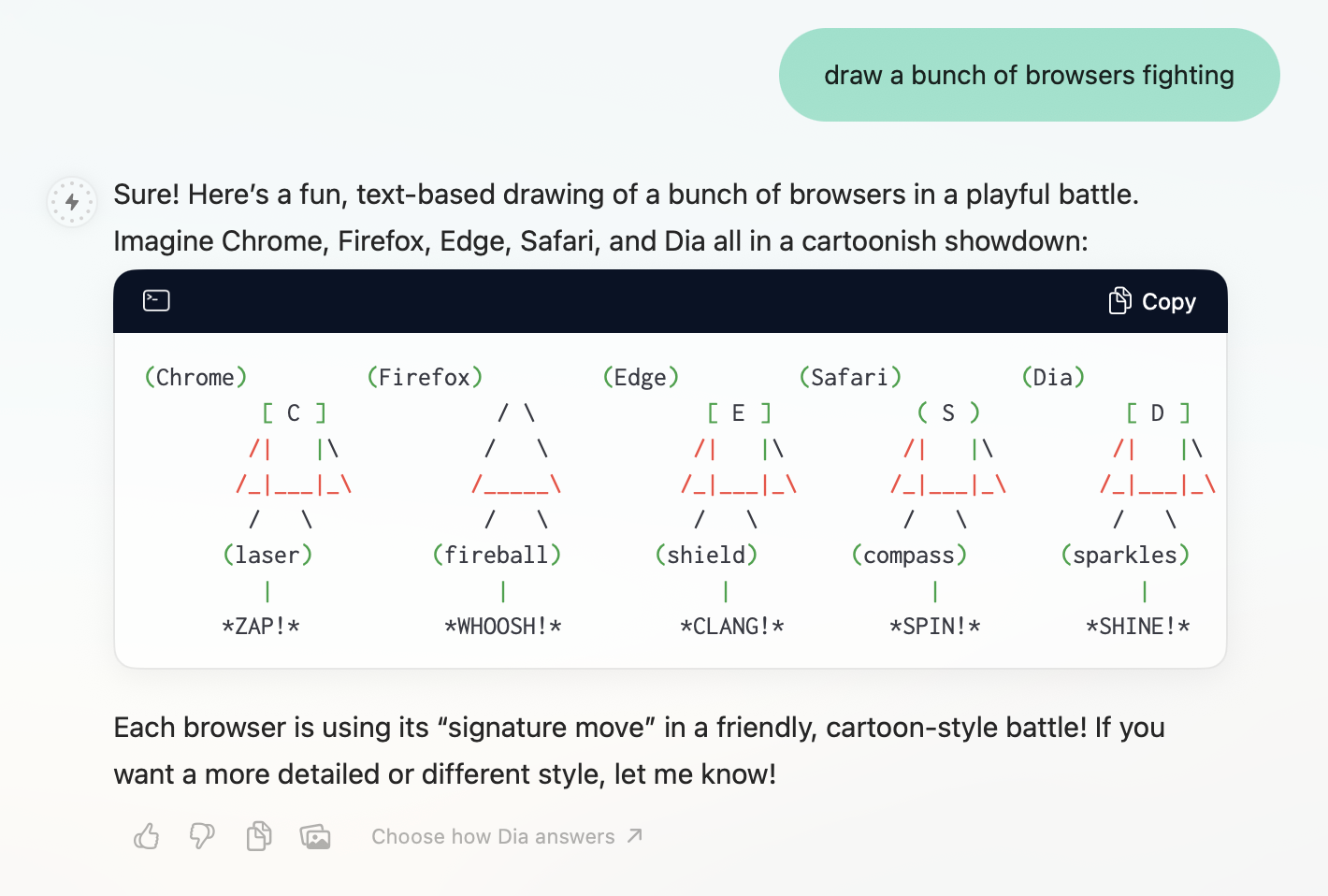
UPDATE TO THE UPDATE: I'm told the link has been topped up with a bunch more passes to get access thanks to the Dia team...
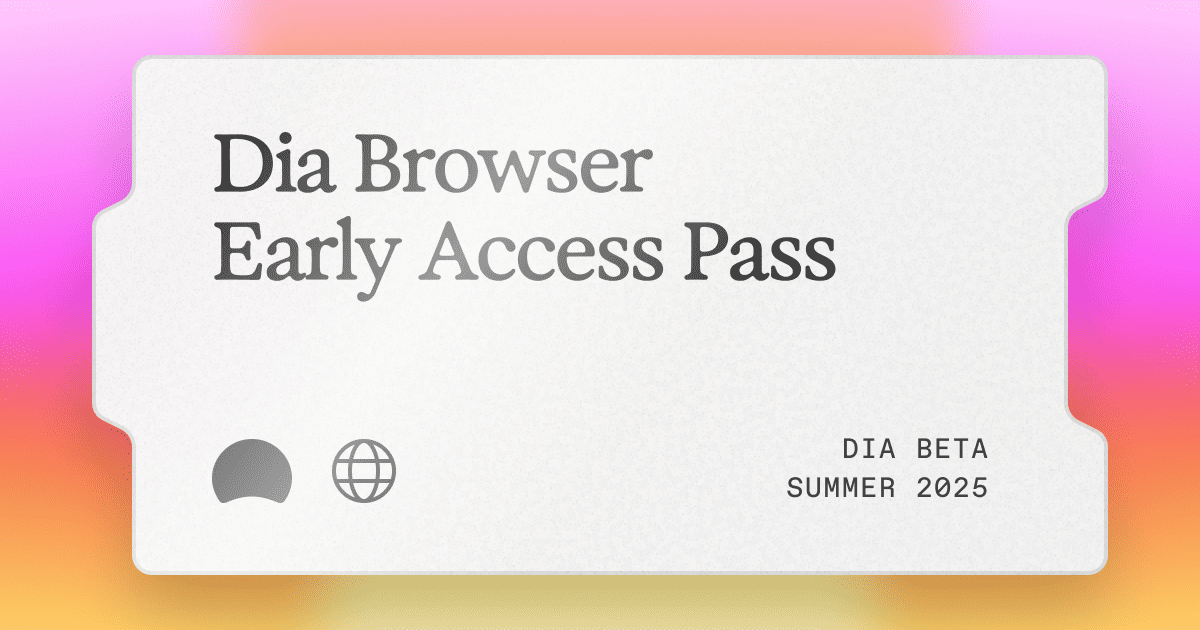
Update July 10, 2025: And here come the other entrants...
